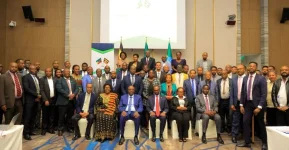Ethiopia and Uganda started their big government meeting today at the Skylight Hotel in Addis Ababa. They call it the Fourth Session of the Joint Ministerial Commission. Both countries waited six years since their last meeting. This two-day event runs through April 4, 2025. Leaders want to make better plans for working together on politics, safety, and business.
Uganda sent Foreign Minister Odongo Jeje Abubakhar with a team of important officials. These people come from many departments, such as trade, transportation, border control, energy, natural resources, defense, and security. Both nations hope to build stronger ties across East Africa and create more business deals.
Ambassador Richard Kabonero, who runs Uganda's Regional Economic Cooperation Department, spoke at the first meeting. He talked about how these countries share history and why these meetings matter. He said Uganda wants to work with Ethiopia on business deals and peace projects. This fourth meeting helps them check what they've done right, fix problems, and plan what comes next.
Ethiopia sent Ambassador Zerinu Abebe to the talks. As Acting Director-General for African Affairs, he mentioned the long friendship between their countries. He explained that today's talks let them review current teamwork and find new ways to help each other. Ethiopia's Ambassador to Uganda, Etsegenet Bezabih Yimenu, stressed that they need signed agreements for defense and security.
Rebecca Amuge Otengo represents Uganda in Ethiopia and at the African Union. She believes these regular meetings help track progress and ensure decisions actually happen. She promised both foreign offices would keep building their partnership. The meeting focuses on three main areas: political talks, security teamwork, and business growth.
Political discussions cover regional peace, government talks, water management across borders, and travel rules. Security talks aim to improve teamwork between police, courts, and border guards. Business plans include more trade, energy projects, mining, tourism, farming, and better roads, railways, and air travel between countries.
Trade numbers between these nations look promising. United Nations data shows Ethiopia sold about $1.71 million worth of goods to Uganda in 2023. They mainly exported plastics, animals, and chemicals. Uganda sold around $4.48 million to Ethiopia that same year, giving Uganda the advantage in trade balance.
Both sides want to fix trade barriers, market access, and immigration rules. Ambassador Kabonero stated that they must work on stronger diplomatic ties, better trade routes, and improved roads, railways, airports, and regional security. These improvements would help both countries grow and prosper. Uganda promised to keep working closely with Ethiopia toward these shared goals.
The Joint Ministerial Commission was established in 1993 and became official in 2011. Leaders agreed to meet every two years, taking turns hosting. The last meeting was held in Kampala in 2019. The COVID-19 pandemic caused the long delay before this current meeting.
Uganda sent Foreign Minister Odongo Jeje Abubakhar with a team of important officials. These people come from many departments, such as trade, transportation, border control, energy, natural resources, defense, and security. Both nations hope to build stronger ties across East Africa and create more business deals.
Ambassador Richard Kabonero, who runs Uganda's Regional Economic Cooperation Department, spoke at the first meeting. He talked about how these countries share history and why these meetings matter. He said Uganda wants to work with Ethiopia on business deals and peace projects. This fourth meeting helps them check what they've done right, fix problems, and plan what comes next.
Ethiopia sent Ambassador Zerinu Abebe to the talks. As Acting Director-General for African Affairs, he mentioned the long friendship between their countries. He explained that today's talks let them review current teamwork and find new ways to help each other. Ethiopia's Ambassador to Uganda, Etsegenet Bezabih Yimenu, stressed that they need signed agreements for defense and security.
Rebecca Amuge Otengo represents Uganda in Ethiopia and at the African Union. She believes these regular meetings help track progress and ensure decisions actually happen. She promised both foreign offices would keep building their partnership. The meeting focuses on three main areas: political talks, security teamwork, and business growth.
Political discussions cover regional peace, government talks, water management across borders, and travel rules. Security talks aim to improve teamwork between police, courts, and border guards. Business plans include more trade, energy projects, mining, tourism, farming, and better roads, railways, and air travel between countries.
Trade numbers between these nations look promising. United Nations data shows Ethiopia sold about $1.71 million worth of goods to Uganda in 2023. They mainly exported plastics, animals, and chemicals. Uganda sold around $4.48 million to Ethiopia that same year, giving Uganda the advantage in trade balance.
Both sides want to fix trade barriers, market access, and immigration rules. Ambassador Kabonero stated that they must work on stronger diplomatic ties, better trade routes, and improved roads, railways, airports, and regional security. These improvements would help both countries grow and prosper. Uganda promised to keep working closely with Ethiopia toward these shared goals.
The Joint Ministerial Commission was established in 1993 and became official in 2011. Leaders agreed to meet every two years, taking turns hosting. The last meeting was held in Kampala in 2019. The COVID-19 pandemic caused the long delay before this current meeting.












